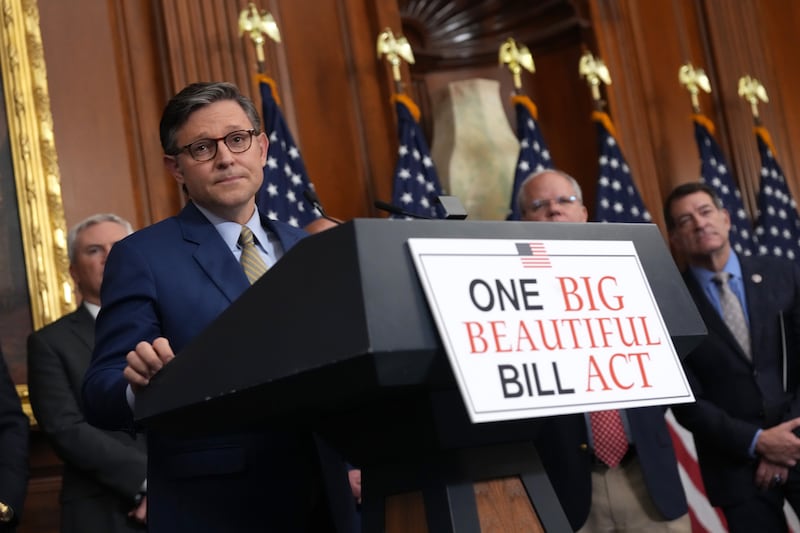When President Donald Trump‘s “one big, beautiful bill” passed through the House this week, Republican lawmakers slipped in a provision to limit the power of the courts.
The move was revealed as the Trump administration has clashed repeatedly with the legal system since the president took office on January 20. Trump and his top officials have attacked court rulings and those who issue them as “activist judges.”
Buried deep in the text of the more than 1,000-page bill is a measure that would restrict the federal courts’ authority to hold government officials in contempt if they violate court orders.
“No court of the United States may use appropriated funds to enforce a contempt citation for failure to comply with an injunction or temporary restraining order if no security was given when the injunction or order was issued,” reads Section 70302 of the so-called One Big, Beautiful Bill Act.
“This is part of a continuing effort to neuter the courts,” said Cornell professor Joseph Margulies. “It is a move to consolidate monarchical power so that there is no longer any effective restraint posed by the judiciary.”

When someone violates a court order, the judge who issued the order has the ability to hold them in contempt and issue fines or even jail time as punishment.
The provision deep in the massive domestic agenda bill would require anyone suing the government to pay a bond before the court could use its contempt power to enforce an order.
This would severely restrict federal courts’ authority to hold officials in contempt if they violate judicial orders, according to the Campaign Legal Center.
“That’s a huge congressional overreach into the judicial branch, spurred on by the executive branch pushing Congress to do this,” said its senior legal counsel, Eric Kashdan.
Since January, Trump has taken sweeping actions to remake the federal government and carry out his agenda in the U.S. and abroad, including firing federal employees and top officials, freezing funds, and announcing controversial policy changes.
But the president’s efforts have been halted and reversed on numerous occasions by the courts. They have ruled more than 170 times against the Trump administration, finding in many cases the administration’s actions were unconstitutional, according to tracking by the New York Times.
In response, the president, vice president, other senior Trump administration officials, and close MAGA allies have attacked judges online, including by name, and sought to undermine the judiciary system as a co-equal branch of government.
Just this week, a federal judge found the administration violated a court order barring officials from deporting people to countries that were not their own without giving them sufficient time to contest it. It is not yet clear what the punishment would be.
Not only would the bill’s provision restrict the courts’ authority, but it would make court orders issued before the law takes effect unenforceable.
“That’s a huge retroactive attack on the rule of law in an attempt to undermine all the decisions that have already been held against the Trump administration,” added Kashdan.
Trump previously directed federal agencies to request a bond in every case where the plaintiff is seeking an injunction against the government with the signing of an executive order on March 11, but the courts have discretion when it comes to the rule, so the order had no teeth.
Even as it was slipped into the massive tax bill, the provision is unconstitutional, Margulies argued.
“Congress can’t infringe on the power of the judiciary to enforce its rules,” he said. “I would say this is a separation of powers violation.”
That is not the only “hidden gem” raising concerns for democracy.
The bill also includes banning state and local laws from being enforced when it comes to regulating artificial intelligence for ten years. It is a broad provision that would ban regulating AI in elections and political campaigns.
“It will be at least a decade… of unchecked AI’s usage creating fake content that is deceptively realistic. It’s going to interfere with voters’ right to know who was trying to influence their vote and what exactly decisions they’re making in an informed way at the ballot box,” Kashdan said.

The bill passed out of the House by just one vote, 215 to 214, early on Thursday after lawmakers stayed up throughout the night on Tuesday and Wednesday to finalize the bill and iron out details to appease Republican holdouts.
It now heads to the Senate, where Republicans have some lofty changes they want included in their version of the legislation which could spell trouble with getting the final bill passed. The goal is to have it wrapped up just in time for the Fourth of July.
It is not yet clear whether the AI ban or court bond requirements will comply with Senate restrictions on what can be included in their bill, but senators will be facing pressure to remove the provisions.
“They’re both an attack on the rule of law, an attack on the judicial branch, and they’ll harm voters,” Kashdan warned.
The post Hidden Threat to Democracy Slipped Into Trump’s ‘Big, Beautiful’ Bill appeared first on The Daily Beast.




